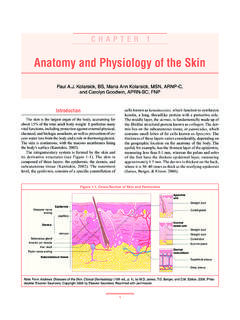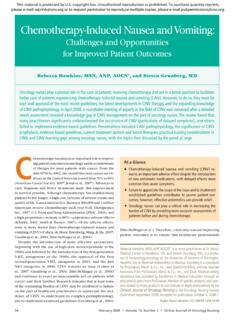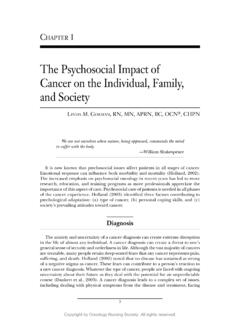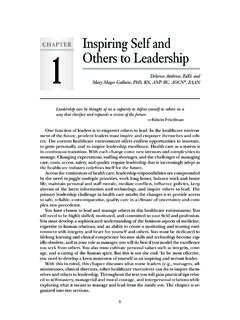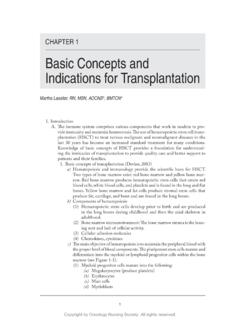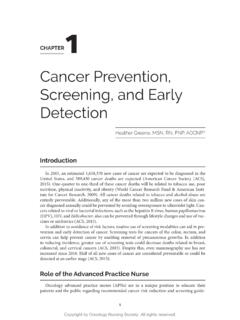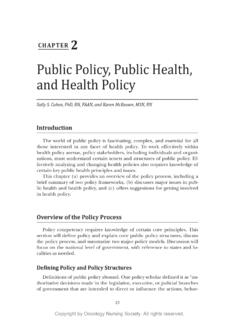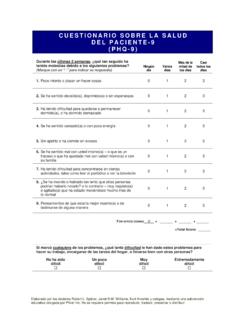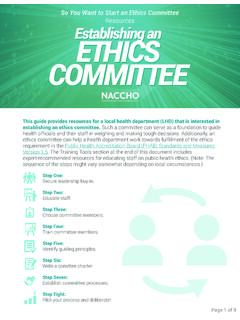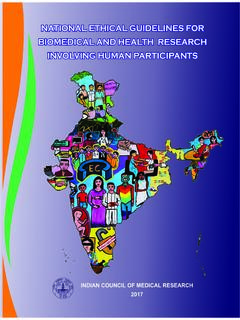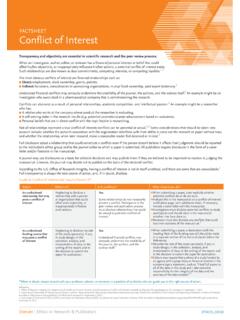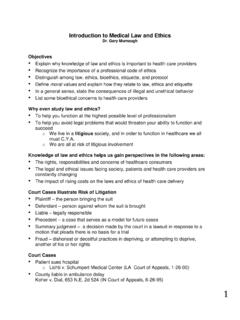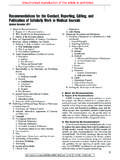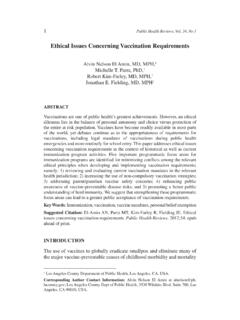Transcription of Principles of Ethics - ONS
1 1 CHAPTER 1 Principles of EthicsAmy M. Haddad, PhD, RNIntroductionWhat kinds of acts are right in oncology nursing practice? This basic yet com-plex question is commonly asked by nurses in oncology and other specialties to determine what they should do in a specific case or how the entire profession should act regarding interactions with patients, families, and colleagues. General ethical Principles often are used as guides for right action. The first such contem-porary example that proposed Principles as guides in a health-related area was the Belmont Report (National Commission for the Protection of Human Subjects of biomedical and Behavioral Research, 1979), which identified the Principles of respect for persons, beneficence, and justice in human subjects research. In 1981, Beauchamp and Childress built on this work and applied it to health care in the first edition of their book Principles of biomedical Ethics , now in its seventh edi-tion (Beauchamp & Childress, 2012).
2 They proposed four key Principles : respect for autonomy, beneficence (the obligation to do good), nonmaleficence (the duty not to harm), and justice. Others in bioethics have suggested additional derivative Principles , including veracity (the obligation to tell the truth), fidelity (the duty to keep promises), and avoidance of killing (Veatch, Haddad, & English, 2010).Although helpful in illuminating shared values and important ethical norms in health care, the principlist approach to Ethics is not without its problems and critics. For example, polarities and problems exist within the Principles them-selves, such as tensions between present versus future expressions of autonomy (Collopy, 1988) or disagreement regarding who is best suited to determine benefit (Childress, 1982). Conflicts can also arise between Principles , such as when one is attempting to fulfill the demands of respect for autonomy, which can run counter to the health professional s obligation to avoid harm.
3 Additionally, no one princi-ple of the four is given primacy, so determining which principle carries the day in Copyright by Oncology Nursing Society. All rights | Ethics in Oncology Nursinga specific case is difficult. Critics have noted that the universal, objective nature of principlism seems to ignore the specific context of an ethical action, which they consider to be an integral component of moral decision making and reflection (Clouser & Gert, 1990; Jecker & Reich, 1995). Even with these criticisms and problems, principlism is the most commonly used approach in healthcare settings and, therefore, is an important part of ethical focus of this chapter is to provide an introduction to the contributions of ethical Principles to oncology nursing practice as well as their limitations. Emphasis is placed on the word introduction, as the discipline of Ethics is compli-cated and what may at first appear to be a clear application to practice often has hidden difficulties.
4 A helpful metaphor for the discussion of Principles and other components of Ethics is to think about what happens when a flashlight shines in a darkened room. A flashlight highlights wherever its beam falls and obscures everything else in the room. The flashlight also causes us to see things in a differ-ent, heightened way than we would under normal lighting (Dougherty, Edwards, & Haddad, 1990). Principles and other elements of Ethics often work in a similar way. Principles can illuminate realities and relationships that we might not have noticed oth-erwise, but they can also de-emphasize other equally important components of Ethics . To help provide a more complete picture of what is involved in Ethics , the selected case study aims to not only highlight where traditional ethical princi-ples are at play in oncology nursing practice but also to enhance understanding of ways to approach ethical Principles of EthicsEthics is the branch of philosophy that explores moral duty, values, and char-acter.
5 In effect, Ethics involves the study of right and wrong, moral responsibil-ities of actors, individual/institutional/societal moral conduct, promises, rules, Principles , and theories. The study of Ethics can also involve the moral value of relationships and other contextual issues, such as power structures and sources of knowledge. Together, these constitute important concerns in contemporary Ethics . As noted, there are several approaches to Ethics , but the one that is most relevant to an exploration of ethical Principles is normative Ethics . Normative Ethics raises the question of what is right or what ought to be done in a situ-ation that calls for a moral decision. It examines individual rights and obliga-tions as well as the common good (Davis, Aroskar, Liaschenko, & Drought, 1997, p. 2).This chapter will examine the relationship of Principles to ethical situations in oncology nursing.
6 However, the moral life is more than merely making discrete decisions to do this or not do that but rather encompasses how people live and think about these matters and, perhaps more importantly, how people work with others to discern the course of action. Therefore, reflection and discussion about Copyright by Oncology Nursing Society. All rights 1. Principles of Ethics | 3ethical actions is also necessary for a fuller understanding of what acts are right. How nurses live the practice of and think about oncology nursing is particularly important because of the often life-threatening and always life-altering nature of cancer. Even in cases where cancer becomes a chronic condition with years of remission and recurrence, the nature of a cancer diagnosis often places the oncol-ogy nurse in complex ethical brief, overarching explanation of the principlism of Beauchamp and Chil-dress (2012) in their now classic Principles of biomedical Ethics is in order before turning to specific Principles .
7 Beauchamp and Childress (2012) proposed a meth-odology to resolve ethical problems that is universally applicable in healthcare settings. As described by Viafora (1999), Principlism relies upon a core of fun-damental Principles themselves based upon some general theory to be applied to rules which function as action-guides (p. 285).Therefore, the Principles serve as a framework, and health professionals pro-vide the facts of the situation or case in question, which when fed into the framework should ideally provide answers or, at minimum, insight into morally correct are based on more general theories. It is helpful to distinguish which theories support which Principles . By shining a light on the theory, one can see the differences between Principles that are oriented to consequences of actions and those that assert that the rightness or wrongness of an act is inher-ent in the act itself.
8 The theoretical approach to Ethics that focuses on outcomes is often referred to as the consequentialist view. A consequentialist deems actions as morally correct when they promote good. In other words, one should choose the action that brings about the most good, or, if there is little chance for a good outcome, the action that yields the least harm. An example of consequentialism in health care is the Hippocratic tradition in medicine that is based on the pro-motion of good for patients to the exclusion of other goods (Edelstein, 1987). Emphasis on the primacy of patient benefit is also evident in the American Nurses Association s (ANA s) Code of Ethics for Nurses, which states, The nurse s primary commitment is to the recipients of nursing and healthcare services patient or client whether individuals, families, groups, communities, or pop-ulations (ANA, 2015, p.)
9 5). There are, of course, more complicated theoretical models of consequentialism, but this basic definition will suffice for this introduc-tory chapter. Principles that derive from a consequentialist perspective are benefi-cence and nonmaleficence, two of the foundational Principles proposed by Beau-champ and Childress (2012). Even without a background in philosophy, almost all health professionals would acknowledge the duty or obligation to do good for patients and to avoid as much harm as possible. Although the two Principles can, and some would argue should, be discussed separately, they often are intertwined in clinical practice. One distinction between the two Principles is that nonmalef-icence is an absolute moral duty in that one is always obligated to avoid harming others. The principle of beneficence, however, is almost an imperative in health care in that it implies that one should promote good but not to the same degree Copyright by Oncology Nursing Society.
10 All rights | Ethics in Oncology Nursingin every case. Beneficence, therefore, is a relative duty in that the obligation to do good for others is tempered by other factors, such as the relationship held by those obligation not to harm others would seem to take priority over most other ethical Principles . Beauchamp and Childress (2012) noted the connection between the principle of nonmaleficence and beneficence but resisted the idea of a hierarchal ordering of the two Principles . They proposed the following norms:Nonmaleficence1. One ought not to inflict evil or One ought to prevent evil or One ought to remove evil or One ought to do or promote of the three Principles of beneficence requires taking action by helping preventing harm, removing harm, and pro-moting good whereas nonmaleficence requires only inten-tionally refraining from actions that cause harm.
